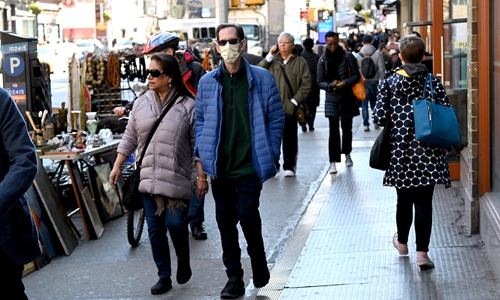HOME >> OPINION
Befuddled by US orders not to wear a mask
By Rong Xiaoqing Source:Global Times Published: 2020/3/19 18:33:40

A person wearing a mask is seen as the coronavirus continues to spread across the United States on Saturday in New York City. Photo: AFT
We're now learning that the COVID-19 pandemic may have been torturing the US for some time, and unfortunately I have only just started wearing a mask when I venture out of my apartment, here in New York City.
I find it unbelievable that my covered mouth and nose are still a rare sight in a country that has become paralyzed by the fear of the virus and where increased testing has finally shown that it is spreading. The authorities here keep telling me not to wear a mask. Federal government advisers, TV health experts, New York City leaders all speak with one voice. They consistently discourage mask buying and wearing, and claim that masks are only useful in preventing sick people from spreading the virus and won't prevent healthy people from being infected.
It is such a radically different situation in Asia, where not wearing a mask you can get in trouble with the authorities and even neighbors. Shops in China and other Asian countries have posted "no mask, no entry" signs.
While there is a different understanding between Westerners and Asians on whether masks can help healthy people stay well, I suspect authorities in the US have been less than straightforward in the advice they give. They argue that ordinary folks don't know how to put on and take off a mask which might increase the chance of infection by touching their faces with virus-covered hands. They also argue that many low-grade masks aren't much protection. The issue prompted me on three occasions to ask New York City officials about wearing a mask. On February 2, when a group of city officials visited Manhattan Chinatown to support businesses that had started to suffer from a loss of business, I asked about the rising number of attacks against mask-wearing Chinese. In response, Dr. Oxiris Barbot, the commissioner of the New York City Department of Health and Mental Hygiene, emphasized that the city didn't encourage healthy people to wear masks because they are ineffective.
On February 20, I moderated a panel discussion about the impact of the coronavirus on communities at the Graduate School of Journalism at City University of New York. When the topic of mask-wearing was brought up, Dr. Syra Madad, senior director of the special-pathogens program for NYC Health and Hospitals, reiterated the city's view that masks can't protect healthy people.
On March 10, at New York Mayor Bill de Blasio's press conference regarding the pandemic, I asked officials in attendance to explain why medical personnel wear masks when they treat patients who may have the virus, if the masks don't provide protection.
Mayor Bill de Blasio said: "But there is a real difference between the interaction the people, every day people, have with others versus when a health professional sees many, many patients in a day in much more intimate dynamics."
Commissioner Barbot said: "It's important for us to first and foremost protect our health care workforce." And then added that mask-wearing may give ordinary people "a false sense of security" and they will overlook important preventive practices such as washing hands. I was confused by that answer. In my experience an uncomfortable mask makes you more aware of the need to take other precautions.
The answers I have received have more or less confirmed my suspicion that the shortage of masks for healthcare workers is behind the advice to the public. Federal government and local governments and hospital authorities don't have enough masks in emergency reserve and were too slow in buying more when the virus first became public known at the end of December. American health workers may pay a very high price for those egregious errors.
Contrast this situation with the reality in China. Chinese central and local governments have never tried to persuade ordinary people to save their masks for healthcare workers and universal mask-wearing was encouraged in an attempt to curb the epidemic. On many other fronts, the call for people to sacrifice their personal interests for the collective good of the nation has been in place from the beginning.
That was the official tone after Wuhan was locked down and when the country needed to send an army of doctors and nurses from around the country to the epicenter, who made a tremendous contribution to China's achievements in controlling the epidemic.
Self-sacrifice has always been considered the highest virtue in a collective culture like China's. Many Chinese healthcare workers were infected by the virus because they didn't wear or have access to protective equipment but there was never an attempt to tell the public not to wear a mask or that they were of no use.
The author is a New York-based journalist and Alicia Patterson fellow. rong_xiaoqing@hotmail.com
RELATED ARTICLES:
Posted in: COLUMNISTS,VIEWPOINT